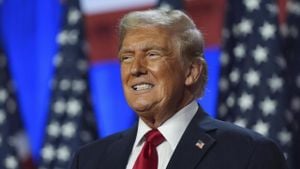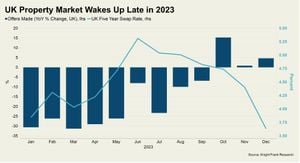Alex Jones and his controversial media empire, Infowars, are on the brink of permanent closure as auction bids for the organization’s assets intensify. Set for court-ordered auction on November 13, 2024, this move arises from Jones’ legal troubles related to the Sandy Hook Elementary School shooting.
Jones finds himself tangled in severe financial distress after being instructed by courts to reimburse the families of the Sandy Hook victims. The total verdict exceeds $1.5 billion, stemming from two cases where he was found liable for defamation and emotional distress due to his false claims about the tragic shooting being staged.
After years of promoting various conspiracy theories through his platform, the auction encapsulates the potential demise of Jones’ influential presence on the media scene. Sources reveal bids have already reached seven figures, with expectations high and the auction to include not just lucrative online assets but studio equipment, trademarks, and even specialized vehicles like armored trucks.
Speculation surrounds potential buyers, including those believed to be close to Jones, who may seek to let him continue his broadcasting endeavors under new management. An individual described as a supportive ally of Jones has reportedly placed one of the higher bids, expressing intent for Jones to remain at the helm.
The legal entanglements all began with Jones’ statements made shortly after the 2012 Sandy Hook shooting, wherein 20 children and six educators lost their lives. His unfounded assertions, claiming the massacre was orchestrated by the government to promote gun control, propelled lawsuits from the bereaved families. Notably, two juries later awarded substantial damages to several plaintiffs, concluding Jones’ claims as both defamatory and damaging to their reputations.
Following these judgments, Jones had taken measures to reorganize and minimize debt through bankruptcy filings, with his companies, including Free Speech Systems, officially declaring bankruptcy to address the financial fallout from the litigation.
The court has since ruled for the auction, where everything from Infowars' website to its social media accounts will be available for bidding. Court supervision has been established to oversee and expedite this process, with the first auction expected to draw significant buyer attention. Insights reveal the estate’s assets are not only financially viable but symbolically significant as they carry both the legacy of Jones' reach and the controversies tied to his brand.
Despite contentious circumstances, Jones continues to broadcast his theories, leveraging his existing platforms on social media to maintain engagement with his audience. He has expressed fervent belief in his supporters' purchasing capabilities, predicting Infowars could continue one way or another depending on who buys it. Mentioning “good guys” and “bad guys,” he portrays the auction as pivotal for his future endeavors.
Jones’ rhetoric has remained defiant, comparing legal proceedings against him to trials from oppressive regimes, decrying judicial outcomes as unfair and unwarranted. Subsequently, he is redirecting fundraising appeals to his followers, emphasizing urgent financial needs to support his operations during this turbulent period.
He asserts if his entities are acquired by those he deems unsupportive, he plans to persist regardless, showcasing both determination and adaptability to continue his advocacy and brand presence. This duality captures the essence of his resilience amid turbulence.
Jones has signaled optimism directed toward his public followers, insisting they remain integral to the future of Infowars and hinting at alternate arrangements for continued broadcasting should the auction result unfavorably.
Further complicity arises from revelations of other groups expressing interest, including liberal organizations aiming to convert the platform's purpose to actively combat misinformation propagated by Jones during his reign. This presents conflicting interests among potential buyers, some of which could alter the operational dynamics of the platform entirely.
Numerous concerns loom over how the fallout of such auctions could reshape the media moral climate, where fundraising and public opinion interplay with the realities of legal accountability. The upcoming auction is seen not just as a liquidation of assets but as potentially pivotal events shaping the discourse surrounding misinformation in media houses.
While auction anticipation builds, the outcome remains uncertain; it’s unclear whether Jones will retain influence through Infowars after the sale. An acknowledgement during broadcasts allows for speculation about his potential legacy regardless of the auction outcomes—will this signify the end or merely the next chapter of his media impact?
Reflecting on the ripple effects of these proceedings, the Infowars saga continues to challenge parameters of free speech, misinformation, and accountability within contemporary media. With the auction imminent, key transitions await as the public awaits to witness how this narrative will resolve.
For now, watchers from both sides—supporters and critics alike—keep their eyes glued to the auction, poised for whatever next steps will emerge from this significant chapter of American media history.



